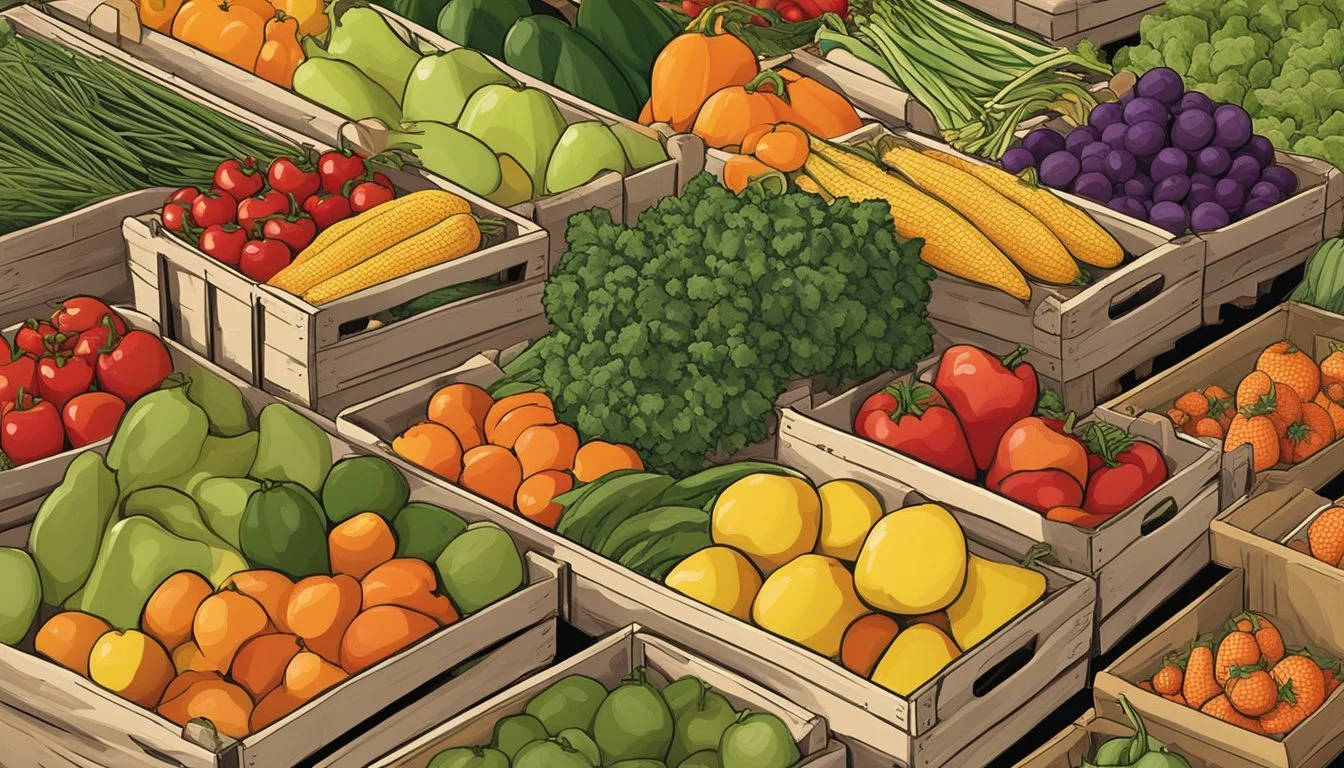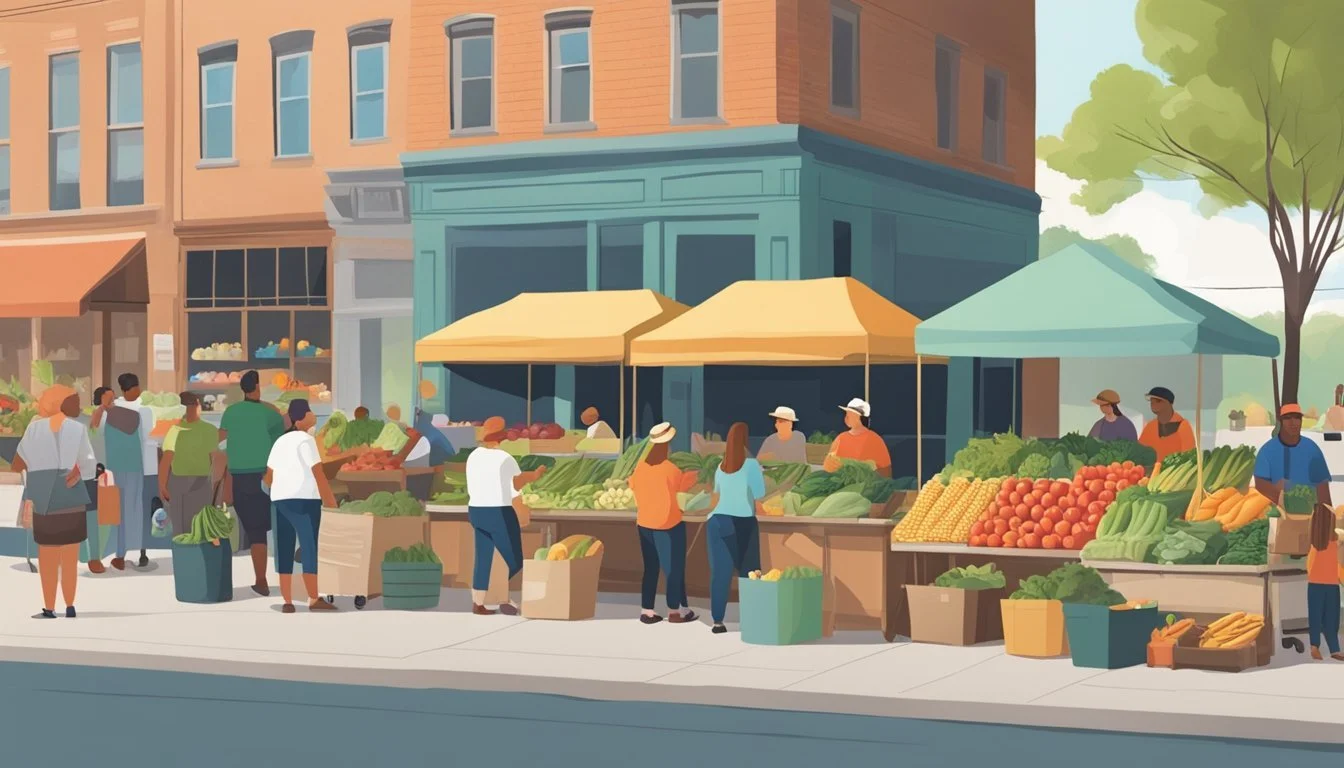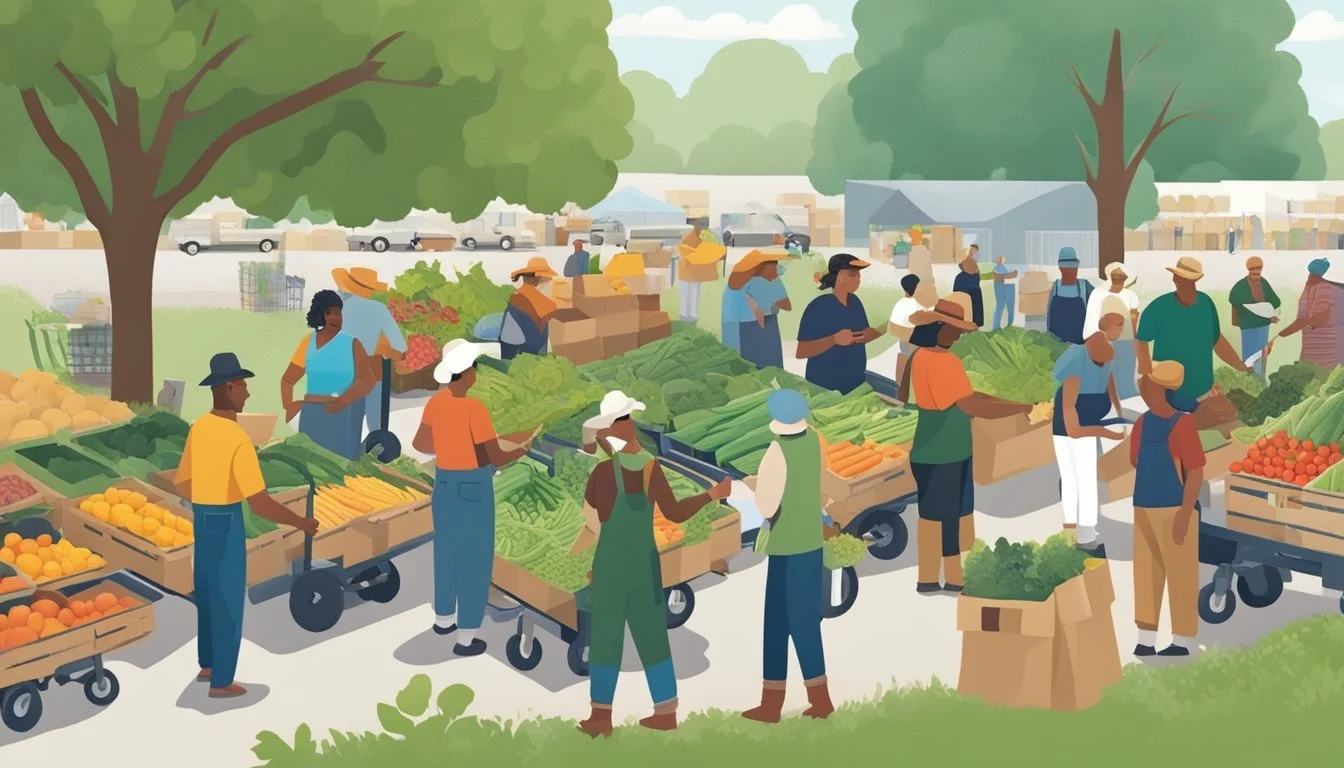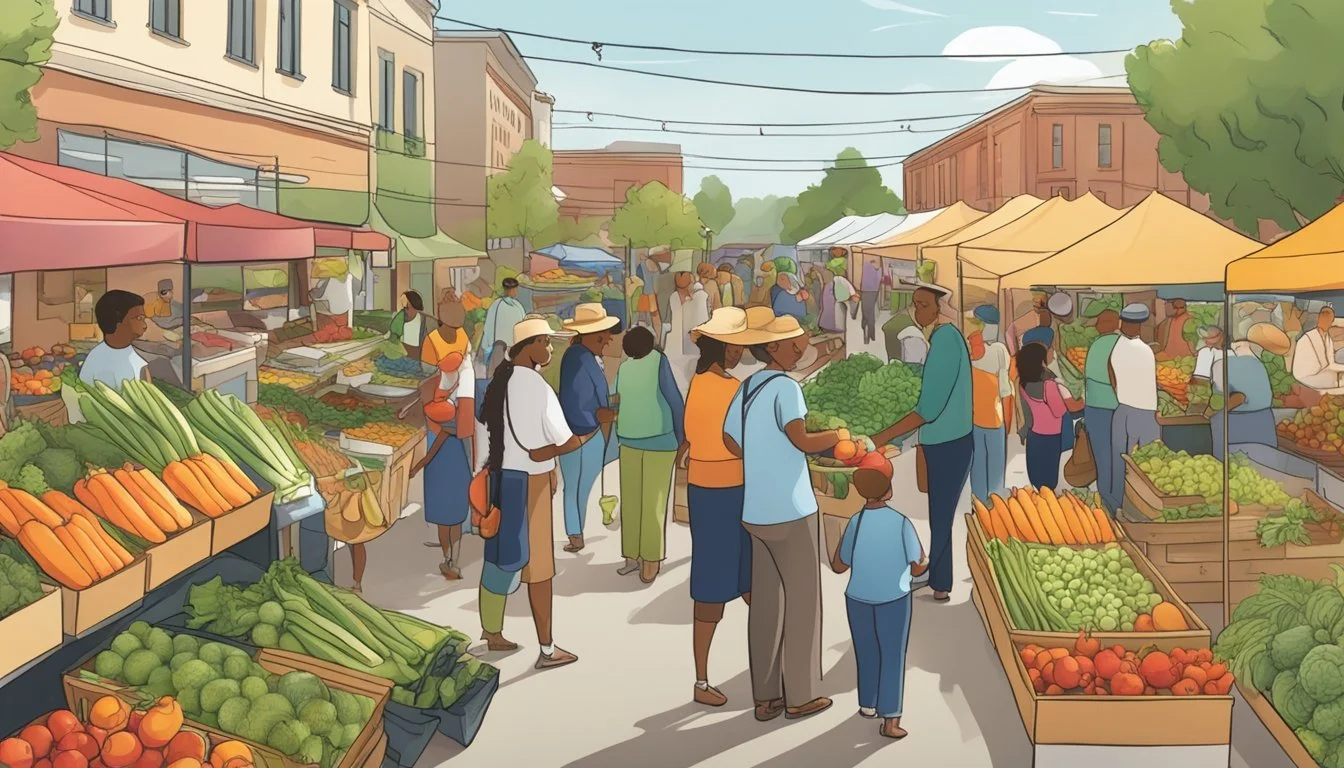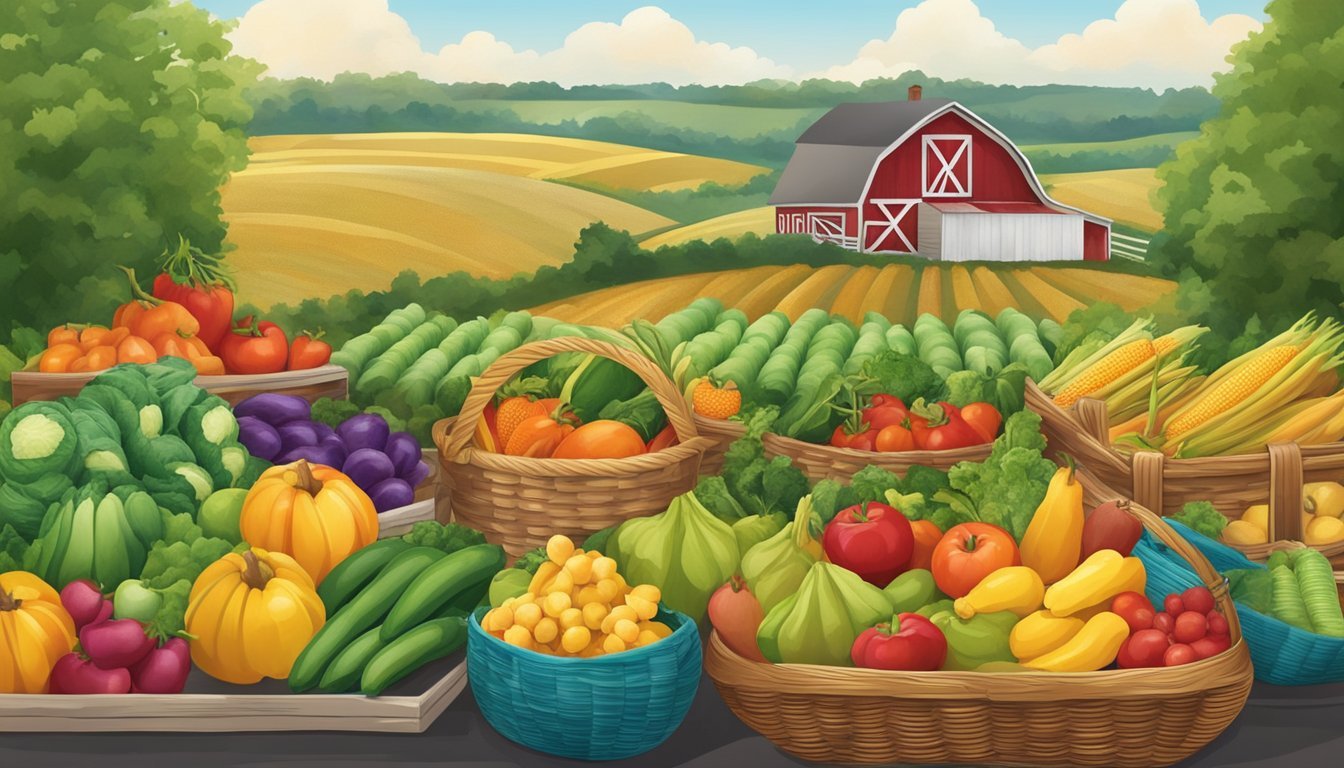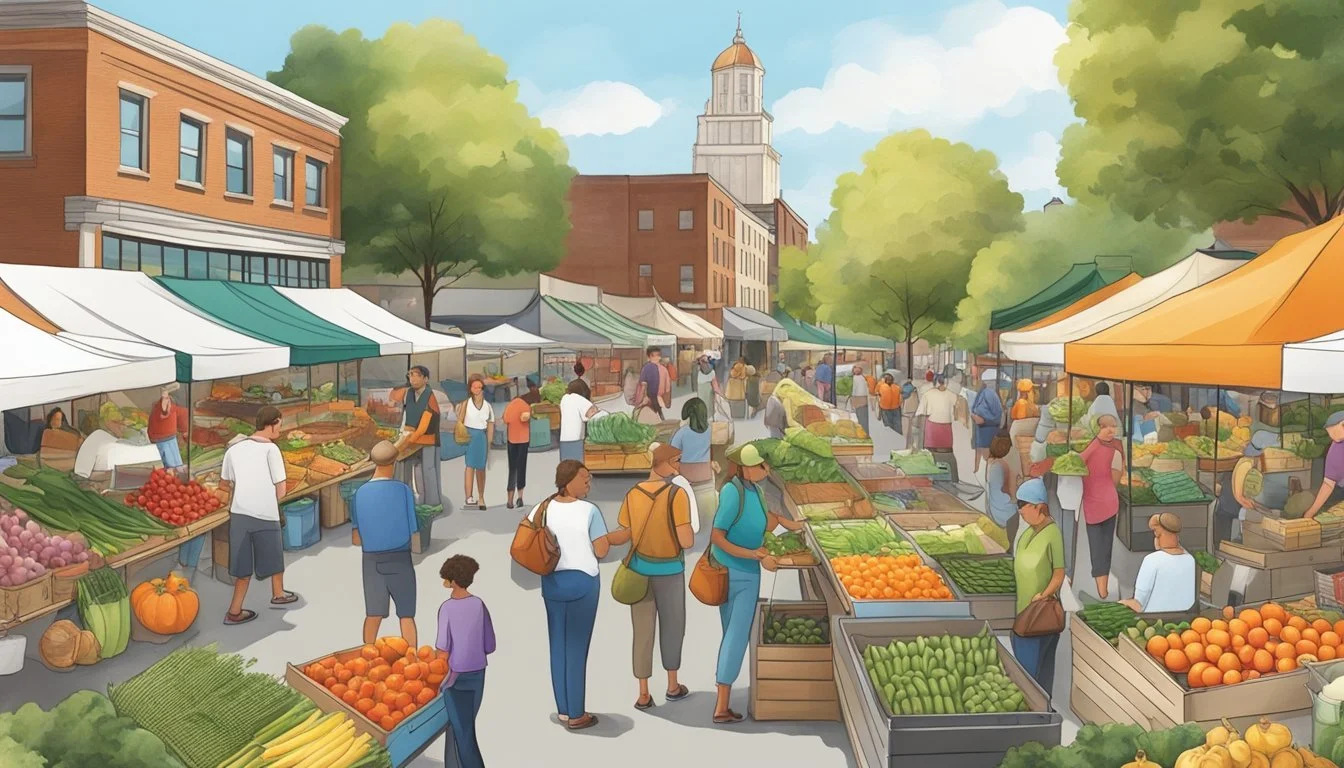Community Supported Agriculture (CSA) in Dayton, OH
A Guide to Local Farm Share Programs
Community Supported Agriculture, commonly known as CSA, has been a growing trend in the Dayton, Ohio area, providing local residents with an opportunity to share in the bounty of nearby farms. Through CSA programs, community members commit to supporting local farmers by purchasing a share of their harvest in advance. This model of agriculture promotes sustainability and fosters a closer connection between consumers and their food sources. Subscribers typically receive a regular supply of farm-fresh produce, and in some cases, meat and other farm products, based on seasonal availability.
Farmers in the Dayton region have adapted to the CSA model, offering a range of options to fit various consumer needs. The framework provides financial stability for growers while allowing consumers to enjoy the freshest produce throughout the season. Some farms offer flexible payment structures, while others provide added benefits such as exclusive updates or access to higher-quality harvests. This symbiotic relationship enhances the local food ecosystem and encourages direct community engagement with agriculture.
CSAs in Dayton pride themselves on adhering to sustainable farming practices, with some farms emphasizing organic and chemical-free growing methods to ensure that members receive nutritious and environmentally responsible goods. The direct partnership between Dayton residents and local farmers exemplifies a vested interest in healthy, locally-sourced food and highlights the community's role in supporting agricultural endeavors.
What Is Community Supported Agriculture (CSA)?
Community Supported Agriculture, commonly known as CSA, is a model that connects local farmers directly with consumers. Members purchase shares of the farm's output, fostering a sustainable food system.
History of CSAs
The concept of CSA originated in Japan during the 1960s when women sought alternatives to industrial agriculture's additive-reliant practices. It gained momentum in the United States during the 1980s as communities sought ways to support local agriculture and obtain fresh, healthy food.
CSA Model and Membership
CSA Model
Membership: Individuals support a farm operation by purchasing a "share" at the season's start.
Distribution: Members receive a portion of the farm's produce throughout the season, sharing the risks and rewards of farming.
Membership Details
Cost: Typically ranges from $400 to $700 annually, often paid upfront.
Benefits: Provides growers with upfront capital and ensures a set customer base; offers consumers fresh, local produce and a direct connection to their food source.
By participating in CSAs, members help sustain local farmers, contribute to a more resilient food system, and enjoy the benefits of fresh produce through a model of mutual support.
Benefits of CSAs in Dayton, OH
Community Supported Agriculture (CSA) programs in Dayton, OH, offer multiple advantages ranging from bolstering local farm economies to promoting healthier lifestyles with access to fresh, nutritious produce.
Support for Local Farms
Dayton's CSA programs directly benefit local farms by providing them with a dependable source of income. When consumers purchase shares in a CSA, they are investing in the farm's operations, often providing funds for essential supplies such as seeds and equipment. Farmers gain a committed customer base, which allows them to plan their crop cycles more efficiently and reduce waste.
Environmental Impact
CSAs in Dayton play a crucial role in fostering sustainable agricultural practices. By purchasing from local farms, consumers help to minimize the carbon footprint related to long-distance transportation of food. Dayton's farms often follow organic or eco-friendly farming techniques, reducing the reliance on harmful pesticides and fertilizers. By supporting these farms, consumers contribute to a healthier environment and promote the conservation of local ecosystems.
Health and Nutrition Benefits
Consumers benefit from Dayton CSAs through the availability of fresh, locally grown produce that is often more nutritious than store-bought alternatives. With weekly deliveries of vegetables and other farm products, consumers enjoy a variety of seasonal items that can lead to a more diverse and balanced diet. The direct farm-to-table connection reassures consumers about the quality and origin of their food, inspiring confidence in the nutritional value of what they consume.
Challenges of CSAs
Community Supported Agriculture (CSA) in Dayton, OH, involves a symphony of factors that can present challenges. Managing expectations and accounting for nature's uncertainties are pivotal concerns that can determine the success of a CSA.
Managing Expectations
Farmers must clearly communicate with shareholders about the realities of the growing season. This includes the types of produce available and the quantity they can expect. Shareholders might hope for bountiful yields every week, but they need to understand that agriculture is subject to variability and not every crop will be as abundant or as predictable as they might wish.
Nature's Uncertainties
Weather: A major uncontrollable element impacting a CSA. Extreme weather, be it drought or excess rain, can significantly alter the output of a harvest.
Pests: CSA farmers often use fewer pesticides than conventional farms, making their crops more susceptible to pest outbreaks. The reduction in chemical use is a draw for many CSA supporters but requires careful, integrated pest management to keep crops healthy.
Farmers must navigate these challenges through careful planning and transparent communication. This ensures a robust relationship with shareholders and the sustainability of the CSA model.
Seasonality and Produce Availability
In Dayton, Ohio, CSA programs provide a variety of fresh produce that aligns with the Midwest growing season, ensuring that community members have access to seasonal, locally-grown fruits and vegetables.
Spring Offerings
In spring, consumers can expect early offerings of leafy greens and crisp vegetables. CSAs often include:
Lettuce: a staple for spring salads
Radishes: packed with flavor, perfect for adding a vibrant crunch
Peas: sweet and tender, ideal for early harvesting
Bok Choy: versatile in stir-fries and salads
Kale: nutrient-rich and hearty
Swiss Chard: colorful and packed with vitamins
These greens mark the beginning of the harvest season, with availability typically starting in May.
Summer Harvest
Summer bursts with a greater variety of produce. From June through August, CSAs are likely to feature:
Tomatoes: juicy and ripe, a summer favorite
Beans: fresh, snappy, and full of flavor
Squash: including both summer squash and zucchinis
Broccoli: for a healthy addition to any meal
Carrots: sweet when freshly harvested
Cabbage: ideal for slaws and salads
Berries also make their appearance in summer:
Strawberries: available in early summer
Blueberries and Raspberries: ripen as summer progresses
Blackberries: typically picked towards the end of summer
Fall Selections
As the weather cools, the selection transitions to hearty fall produce. In October and beyond, patrons can find:
Pumpkin: a symbol of fall and cornerstone of hearty dishes
Potatoes: a cold-weather staple
Beets: earthy and perfect for roasting
Eggplant: lending depth to warm dishes
Garlic and Onions: essential for flavoring autumnal stews and roasts
Leeks: milder in taste, excellent in soups and pies
Cool-weather crops like kale and carrots continue through the fall.
Year-Round Options
Some farms offer produce that is available regardless of the season, such as:
Herbs: like sage, available fresh in multiple seasons or preserved for off-season use
Veggies: selected varieties of vegetables are grown in greenhouses or through other season-extension techniques to offer year-round availability
In addition to fresh produce, CSA shares in Dayton may include other farm products like straw and eggs throughout the year.
Exploring CSA Farms in Dayton, OH
Dayton, OH harbors a thriving community of CSA farms, offering a range of products from grass-fed beef to organic vegetables. Leveraging sustainable practices, these farms highlight a commitment to both the environment and the local community.
Farm Profiles
The Clark Family Farm: Located in New Carlisle, this farm is known for its 100% grass-raised, grass-finished beef. Available for the 2024 harvest, customers can reserve beef for various dates throughout the year, ensuring a steady supply of high-quality meat.
Mile Creek Farm: With a 15-year history, Mile Creek Farm plays a pivotal role in Dayton's CSA scene. Catering to approximately 325 households, they provide diverse share sizes and options, including home delivery and community pick-up spots.
Patchwork Gardens: Positioned on Route 35, this small produce farm abstains from chemical use, opting for certified organic methods to cultivate their crops. Their focus on chemical-free and organically grown produce resonates with the health-conscious consumer.
Keener Farm Charitable Organization: While functioning as a CSA, Keener Farm demonstrates a dedication to fostering a sustainable local food system. Their parent-company's support extends beyond the farm to broader community initiatives.
Organic Certification
The farms that achieve organic certification in Dayton abide by stringent guidelines designed to protect the environment and promote ecological balance. For example, a CSA in Hamilton is set to be certified organic starting in July 2024, illustrating a trend toward organic accreditation within the region.
The Role of Urban Farms
Urban farms in Dayton, such as those operated by CSA programs, are vital to reinforcing local food systems. By turning urban spaces into productive agricultural land, these entities often focus on organic methods to provide residents with access to fresh, organic products. They stand as testaments to the ingenuity and resilience of local food producers, adapting to the urban environment to meet community needs.
Community Involvement and Education
Community Supported Agriculture (CSA) in Dayton, OH emphasizes both community involvement and educational opportunities. These programs often engage members through hands-on workshops and volunteer initiatives, while also offering educational tours and programs that connect with local schools.
Workshops and Volunteering
CSAs in Dayton provide a host of workshops where community members can learn about sustainable farming practices and the importance of local food systems. Volunteering opportunities are abundant during the growing season, where individuals can get their hands dirty by assisting with the day-to-day operations of the farm. This direct involvement helps to foster a deeper understanding of agriculture and its impact on the community.
Workshops offered: composting, organic gardening, crop rotation
Volunteer activities: planting, harvesting, farm maintenance
School Programs and Tours
Local farms often collaborate with schools to establish programs that educate young minds about where food comes from and the importance of supporting local farms. Tours are tailored to be age-appropriate and provide interactive experiences that can include everything from planting seeds to learning about the ecosystem within the farm's gardens.
School program topics: nutrition, local ecosystems, plant life cycles
Tour features: hands-on gardening, Q&A sessions with farmers, tasting sessions
Beyond Produce: Other Offerings from CSAs
While Community Supported Agriculture (CSA) programs are often synonymous with seasonal produce, many extend their offerings beyond fruits and vegetables. These can include a range of products from eggs and poultry to dairy and specialty items, providing consumers with a wider array of local, sustainably sourced goods.
Eggs and Poultry
Many CSAs in Dayton offer shares that include eggs and poultry. The eggs typically come from free-range chickens, ensuring high animal welfare standards. Consumers often praise the rich flavor of brown eggs that are part of these CSA packages. Additionally, families can opt for poultry options, which may include a variety of birds, all raised on family farms with a focus on sustainable practices.
Meat and Dairy
Beef, pork, and sometimes lamb are common types of meat found in CSA shares, catering to those who prefer to know the origin of their meats. These meats are frequently from animals that have been pasture-raised on local farms. Dairy products such as milk, cheese, and yogurt are also available, offering a farm-fresh taste and the peace of mind that comes with support for sustainable farms.
Specialty Crops and Flowers
CSAs might offer a variety of herbs and specialty crops tailored to the Ohio climate and soil, encouraging the exploration of new flavors in cooking. Additionally, some CSAs provide the option to include cut flowers in their shares. These flowers not only beautify the home but also support biodiversity and the local ecosystem. Consumers also have access to other products like honey, which is a sweet testament to the diverse offerings of CSA programs.
Selecting the Right CSA for You
When searching for a Community Supported Agriculture (CSA) program in Dayton, OH, individuals should consider what attributes align with their needs and understand the commitments entailed by CSA agreements. The best choice will optimize their access to fresh, local, and nutrient-dense produce while supporting the farming community.
Factors to Consider
Type of Share: CSA shares vary, and a person must choose based on their consumption needs. Options often include:
Vegetable Share: a selection of seasonal vegetables.
Full Share: might include fruits, meats, dairy, and other farm products.
Half Share: suitable for smaller households or those new to CSA.
Pick-up Location and Schedule: Proximity to the farm or pick-up points and schedule compatibility are crucial. Most CSAs have designated times and places for members to collect their shares.
Farm Practices: Individuals seeking environmentally sustainable practices should inquire about the farm's methods. This might include:
Organic or pesticide-free cultivation.
Regenerative agricultural practices.
Cost: It is important to consider whether the CSA provides an affordable way to obtain fresh produce compared to regular market prices, keeping in mind that upfront membership fees are common.
A table summarizing key aspects:
Aspect Description Share Type Vegetable, Full, Half — suited to consumption needs Pick-Up Location and time should fit the member's schedule Farming Practices Preference for organic or sustainable farming methods Affordability Evaluate cost-effectiveness compared to market shopping
Understanding CSA Agreements
Commitment Period: Most CSAs require members to commit for a full growing season, ensuring support for the farm's operational stability.
Shared Risk: CSA members should recognize they share in the risks of farming, meaning produce availability might vary with weather and other factors.
Communication: Prospective members should examine how the farm communicates with its shareholders. Transparency about crop statuses, availability, and farm events is key.
Before joining a CSA, one should meticulously review the farmer's contract or member agreement to fully understand the terms of participation, ensuring an alignment of expectations.
Conclusion
Community Supported Agriculture (CSA) has established a significant presence in Dayton, OH, reflecting a growing trend towards sustainable and locally sourced food. Local farms such as the Clark Family Farm in New Carlisle and a family-owned farm in Hamilton are testament to the region's commitment to this movement. They offer consumers opportunities to support local agriculture while receiving fresh, seasonal produce directly from the source.
CSAs are found to promote a sense of community resilience and stewardship, fostering closer relationships between residents and the farmers who feed them. Consumers have shown appreciation for the ability to engage directly with food sources, embracing the shared responsibility that comes with CSA participation. The practice not only supports local economies but also contributes to environmental sustainability by reducing food transportation and encouraging organic practices.
As Dayton's CSA programs head into 2024, there is an evident expansion and increased interest in organic options. Customers of CSAs in Dayton can often choose between different payment plans, such as upfront or monthly options, which makes it accessible to a wider range of households.
The model of CSA brings consumers and farmers together, with a common goal of creating a more sustainable and connected food system. Dayton's supportive environment for CSA initiatives indicates a promising future for local agriculture and a healthier society.

